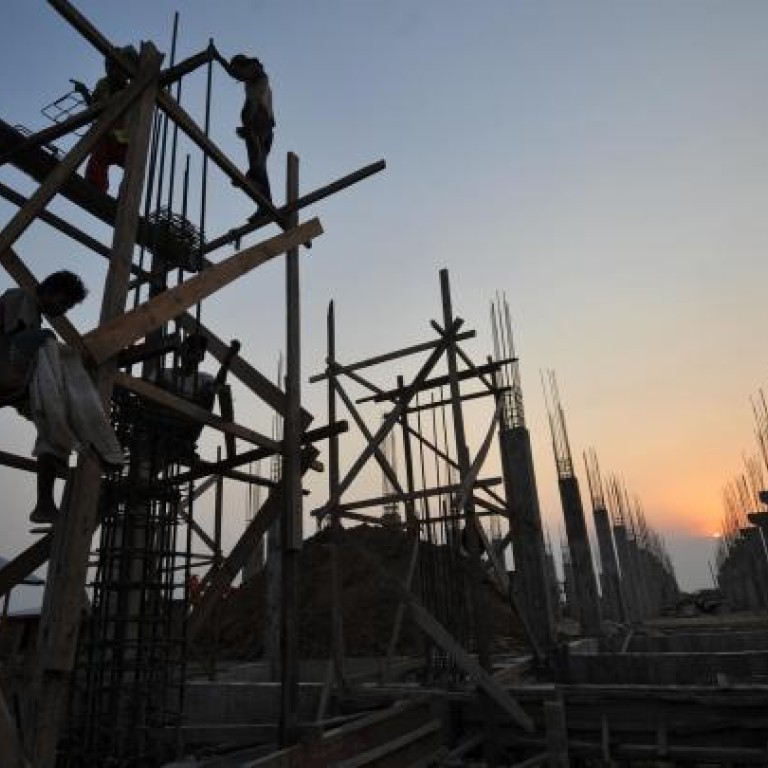
Myanmar's poor infrastructure holds it back but Hong Kong firms see opportunities
Deficiencies in infrastructure are holding back progress in realising the country's huge potential, but they're also golden opportunities
Myanmar's backward infrastructure threatens to create a bottleneck, holding back the country's rapid development. But for Hong Kong companies fresh from helping transform mainland China over the past 30 years, it adds up to opportunity.

"The road surface is the result of the uneven settlement of the building material and substandard construction skills," says Kuok Hoi-sang, vice-chairman and managing director of Chevalier Group, a Hong Kong-based international company with interests in Myanmar, including in construction.
Naypyidaw is an oversized city with a handful of hotel resorts sitting alongside an eight-lane main road. The absence of traffic makes the road look even wider, and provides a stark contrast to the hustle and bustle of pedestrians and vehicles in Yangon.
The sizeable hotels of Naypyidaw look beautiful from the outside - but take a closer look and you will discover a very primitive interior design, echoing the lack of building technique in the country, Kuok says.

It's not just the construction that is shoddy in Myanmar.
A delegation from the Hong Kong Trade Development Council discovered first-hand the unreliability of the power supply when the lights went out on their first night in a five-star hotel in Yangon last month.

For some Hong Kong businesspeople, the state of Yangon and Naypyidaw is a reminder of their visits to Shenzhen in the early 1980s and Ho Chi Minh City in the 1990s
"Having said that, Myanmar is in a better shape than Vietnam in terms of legal system, as Myanmar is practising the British legal system," Kuok says. People in Myanmar also seem more peaceful and compliant than the Vietnamese, he says.
Dr Joseph Chow Ming-kuen, independent non-executive director of Hong Kong-based Road King Infrastructure, says the railway network in Myanmar is underdeveloped, given the population of 60 million and the large size of the country.

There would be great potential for Hong Kong's MTR Corporation to explore the railway market in Myanmar, he says.
As for the power problem, Chow says Hongkong Electric is poised to invest in Myanmar.
"Myanmar is rich in natural gas resources, which could be used for recouping the initial losses in power plants and grid construction," he says. Power Assets, the parent company of Hongkong Electric, said it was looking at many investment opportunities aboard.
For Hong Kong companies of small to medium size, which lack government backing to help them compete with their Japanese and Korean rivals, Chow suggests that they bolster their chances by forming a consortium comprised of all the related professionals, from lawyers, accountants, bankers and architect to contractors and construction companies.

However, architect Cheung Kwong-wing, director of Dennis Lau & Ng Chun Man Architects & Engineers (HK), is doubtful about the returns on infrastructure projects in Myanmar.
He points to the charge levied for driving the 320-kilometre toll road between Yangon and Naypyidaw, which at US$10 per coach, or less than three US cents per kilometre, is far below the level charged in mainland China.
Cheung says residential or hotel property and trade-related facilities such as logistics service centres and convention centres would have a better chance of paying their way.
Kuok agrees that property development has great potential in Yangon. He is looking for a local partner to develop some upmarket residential projects with fewer than 100 flats in the city.
The prices of flats at a newly built low-rise apartment building on the main road in Yangon are between US$120,000 and US$150,000. The area of the flats is 1,000 square feet, giving a price per square foot of between HK$936 and HK$1,170.
"It is very promising," says Kuok, who estimates it costs about HK$700 per square foot to build such flats.
Architecture, construction and building service companies in Hong Kong are in the process of diversifying their portfolios away from mainland China, since the cooling measures by Beijing have put some property projects there on hold.
"We have to prepare for worse when things still look pleasant," Cheung says. Myanmar is a market with great opportunities compared with other countries in Southeast Asia, which are more mature and sophisticated and have less room for Hong Kong professionals, he says.
A lack of urban planning, poor road-junction management and a shortage of roads, flyovers and tunnels in Yangon have fuelled traffic jams in the city, which is creating a drag on the economic growth of the country.
"Myanmar is developing rapidly but the infrastructure facilities there fall short of demand and will curb its growth to a certain degree," says Otto Poon, chairman of Analogue Holdings, a Hong Kong building services company.
